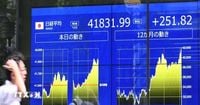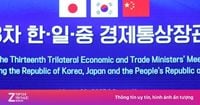On April 1, 2025, Asian stock markets showed signs of recovery after suffering significant losses in recent days, yet the overall market sentiment remained subdued as U.S. President Donald Trump prepared to announce new, sweeping tariff measures. This cautious optimism followed a strong sell-off that particularly impacted major automakers like Toyota and Honda, leading the Tokyo market to close sideways at 35,624.48 points.
Despite the mixed signals, other markets in Sydney, Seoul, Bangkok, Singapore, and Wellington experienced gains, while the Mumbai market declined. The Hang Seng Index in Hong Kong rose by 0.38% to 23,206.84 points, and the Shanghai Composite Index in Shanghai increased by 0.4% to 3,348.44 points at the close of trading on April 1. Investors were bracing for what Trump referred to as "Liberation Day," scheduled for April 2, when he is expected to impose tariffs on "all countries" in response to perceived exploitation of the United States over the years.
Trump's warning last week about a potential 25% tariff on imported cars and auto parts has intensified the sense of pessimism among investors. The lack of specific details regarding the targeted countries and the extent of the tariffs has created an atmosphere of uncertainty, putting pressure on stock prices across the board and raising concerns about a potential economic downturn.
In a related development, trade ministers from China, Japan, and South Korea held their first economic dialogue in five years on March 30, 2025. During this meeting, they agreed to coordinate responses to the anticipated U.S. tariffs. The dialogue aimed to facilitate regional trade as these Asian exporting nations prepared to navigate the impending tariffs from Trump.
According to reports from state media in China, Japan and South Korea expressed a desire to import semiconductor materials from China, while Beijing showed interest in acquiring chips from both countries. The meeting also resulted in a consensus to enhance supply chain cooperation and discuss export control measures. However, the South Korean Ministry of Trade cautioned that the media may be exaggerating the notion of a "joint response to U.S. tariffs," emphasizing that the discussions focused more broadly on the global trade environment and the importance of economic collaboration.
Following the dialogue, the trade ministers committed to accelerating negotiations on the China-Japan-South Korea Free Trade Agreement, recognizing the need for cooperation to address current economic fluctuations. A joint statement from the meeting highlighted the shared understanding among the three nations of the importance of maintaining collaboration amidst the changing economic landscape.
The upcoming announcement from Trump on April 2 is poised to significantly impact global trade dynamics, particularly for countries like China, Japan, and South Korea, which are crucial trade partners for the U.S. The potential for retaliatory measures from these nations adds another layer of complexity to the situation.
As the situation unfolds, market participants are keenly observing the developments, aware that any coordinated response from these Asian nations could have far-reaching implications for trade relations and the global economy. With the stakes high, the business community is left to navigate a landscape fraught with uncertainty and potential volatility.
In domestic markets, Vietnam's VN-Index rose by 10.47 points (0.80%) to 1,317.33 points, while the HNX-Index increased by 1.36 points (0.58%) to 236.42 points. These gains reflect a cautious optimism among investors in the face of the broader regional market trends.
Overall, the interplay between U.S. tariff policies and the responses from Asian nations will be critical to watch in the coming days. As businesses and investors alike prepare for potential shifts in the economic landscape, the outcomes of these developments could shape trade dynamics for years to come.





